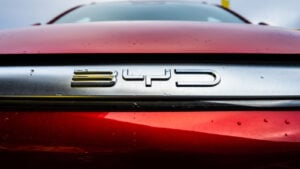The electric vehicle sector continues to face a litany of issues. Demand dynamics are not what they once were and EV stocks have cratered — along with lithium prices — as a result.
One of the bigger issues is that electric vehicles also face a number of quality control issues. That may come as a surprise because pundits have long touted EVs — with fewer components — as potentially being more reliable. However, theory often differs from practice: Over the past 3 years EV owners have reported 79% more problems with their vehicles than owners of traditional vehicles.
To be fair, EVs are new technology. It will take time for quality to catch up. Nevertheless, those issues make these three stocks a no-go.
General Motors (GM)

General Motors’ (NYSE:GM) management is well aware of quality control issues with its electric vehicles. The company has been appealing to investors as it transitions to an EV future intended to boost its stock price.
CFO Paul Jacobson admitted that the company has to resolve quality control issues if it ever hopes to be successful in efforts to become an EV-driven car maker. Jacobson stated: “We’ve had a couple of unfortunate delays in the programs and we’re making sure that we work out the final bugs because the most important thing, especially when you’re coming with a new platform like these EVs”.
One Such delay occurred recently when the company decided to halt sales of the Chevy Blazer EV amid reports of spontaneous shutdowns. The vehicle’s infotainment systems have been blanking out. Furthermore, there seems to be problems with the vehicle’s battery which is not charging in some instances. For investors who wondered if the EV push was overdone at General Motors this is a great reason to avoid the stock.
BYD (BYDDY)

It might surprise readers to learn that BYD (OTCMKTS:BYDDY) is the largest EV maker globally. The Chinese manufacturer leads its domestic market and has also expanded internationally. That has generally been a boon for its stock over the past few years. However, it is facing quality control issues which could negatively affect share prices moving forward.
Reports show that vehicles shipped to Japan had scratches on the paint and those shipped to Europe were plagued with mold. BYD has also made a big push into Southeast Asian markets. In Thailand, the vehicles have become infamous for problems with chipping paint and plastic. In Israel, there are multiple reports that roofs have warped under the weight of roof racks.
An executive from BYD remarked in the Wall Street Journal that paint chips were the equivalent of going to a “decent” restaurant and receiving food served on a chipped plate. Strange comparison aside, it’s absurd to refer to your own products as “ decent”. That remark could signal a wider commitment to quality is needed at the company.
Fisker (FSR)

The Fisker (NYSE:FSR) Ocean seems like a dangerous vehicle. That’s a great reason to avoid investing in its stock at this time.
The company has received hundreds of complaints related to various issues with the electric vehicle. One of the most common is a sudden loss of power. In fact, Geeta Gupta Fisker, wife of CEO Henrik Fisker was driving one of the vehicles when it suffered such a fate.
The loss of power in her vehicle was one of more than 100 separate incidents in which the vehicles suddenly stopped operating. As serious as that issue is, it isn’t the only issue playing the vehicle. The vehicle has also been plagued by a sudden loss of braking power and issues in which the key fob gets locked inside the vehicle not due to operator error.
Furthermore, there are instances of the hood flying up during operation. It isn’t difficult to imagine catastrophic accidents resulting from those quality control issues. As a result, investors should avoid fiscal stock at this time.
On the date of publication, Alex Sirois did not have (either directly or indirectly) any positions in the securities mentioned in this article. The opinions expressed in this article are those of the writer, subject to the InvestorPlace.com Publishing Guidelines.
